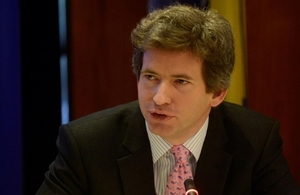Proud that UK supported Bosnia and Herzegovina in creating new anti-corruption strategies and detailed action plans
Opening remarks by Ambassador Edward Ferguson, at the Fight Against Corruption Conference organised in Sarajevo to mark 9 December - the International Anti-Corruption Day.

Ambassador Edward Ferguson, British Ambassador to Bosnia and Herzegovina
British Ambassador Edward Ferguson opened the Conference on Fight Against Corruption today in Sarajevo, hosted by the Agency for the Prevention of Corruption and Coordination of the Fight against Corruption (APIK), in partnership with Transparency International Bosnia and Herzegovina, and supported by British Embassy Sarajevo. The Conference was organised to mark 9 December, the International Anti-Corruption Day.
In his remarks, Ambassador Ferguson said:
Ladies and gentlemen, good morning!
I am honoured to be here with you all today, and I’d like to start by thanking and commending APIK for organising today’s event – the first time that this has happened – to mark World Anti-Corruption Day.
We hear a lot of talk about the battle against corruption in BiH. It doesn’t always feel that the words describe the reality: nije borba, nego borbica.
I hope that today’s conference is a sign that things are changing. And it wouldn’t be a moment too soon.
We all know that corruption is pervasive in BiH. According to a recent GALLUP survey, BiH is the country with the second highest perception of corruption amongst its citizens – 89%. This data is supported by the Transparency International Global Corruption Barometer survey, with 90 per cent of citizens believing that corruption in political life is very high.
According to Transparency International’s data, 28% people in BiH reported having paid bribes in the past year.
It is disappointing – although frankly not surprising – to see that political parties are seen to have the highest rates of corruption, followed by the parliaments and legislative bodies. The health and education sectors are not far behind. I must say that as a newcomer to BiH, I find the idea of corruption in the health sector, and the exploitation of people when they are at their most vulnerable, particularly appalling.
And if this is not worrying enough, the judiciary and the police rank just behind these sectors. Sadly, many ordinary people have told me that corruption has become so engrained in the culture and psyche of this country that they offer bribes even if they are not requested, as they fear the consequences of not doing so.
However, the flipside of this is that it means there is still hope. Up to 60% of the BiH people believe that ordinary people can make a difference in the fight against corruption. This is a majority of the people living in the BiH. So let us use this enormous potential, and aim to change the culture and mindset of Bosnia and Herzegovina.
Very soon, both the State and Entity levels of government will have new anti-corruption strategies, supported by detailed action plans. This is an important step forward. And we are proud that UK was part of that process through our programme support to the Entity governments and to APIK. These strategies summarise all the problems and set out a comprehensive and structured approach to strengthen the fight against corruption.
Top-down action by governments at all levels is essential. When Federica Mogherini, the EU High Representative, was here last week with Commissioner Hahn, they said that they weren’t looking just for signatures, headlines or principles, but for concrete and tangible results in implementation.
That’s what we need to see from the governments now – a move from a declarative to an operational phase of implementing the strategies. And we will continue to support that work. The fight against corruption and the improved functionality of the BiH institutions will be a core element of the EU’s new approach in BiH. And we will continue to work with and to encourage NGOs and civil society working in this space. Only together will we be able to change the culture.
And why is this so important? Well, corruption stifles economic growth and investment. It adds up to 25% of the cost of procurement contracts in developing countries. The World Bank estimates that Bribery can add up to 10% to business costs globally. And by increasing the costs and uncertainties of doing business in a country, it deters investors – particularly reputable firms from developed nations, and SMEs and entrepreneurs, who have fewer resources. Ultimately, this stifles innovation and creates a more uneven playing field.
The fight against corruption needs to be 24/7. No government can afford to underestimate corruption and let it became embedded in society. And that includes the UK.
In the last year alone, the G8 Summit, the UK Bribery Act and the Open Government Partnership (OGP) have provided a strong platform to press for global change to promote transparency and action against corruption. As Presidency of the G8 and lead co-chair of the Open Government Partnership, we challenged and gained commitment from countries on open data, land, tax extractives, trade, beneficial ownership and governance.
I am pleased that BiH recently joined the Open Government Partnership and as such will be developing a National Action Plan, which will cover issues such as freedom of information and publishing more government data, which enables citizens to see what their elected politicians are doing and where money is spend.
So ladies and gentlemen, once again, I’m delighted to be here with you. There are many “International Days”, but this is a really important one and I’m delighted that APIK is making the most of it to promote their work. Hopefully, next year, we’ll be joined by the new Prime Minister and meeting in the State Parliament…
Thank you very much.